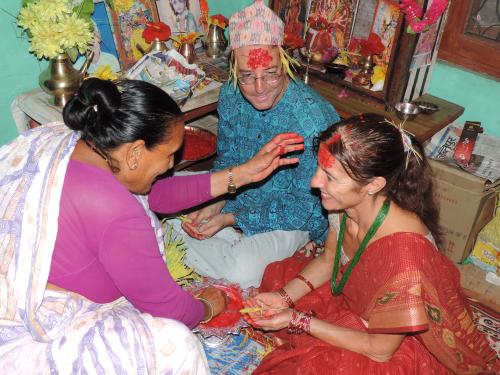
“Throughout the country the goddess mother is worshiped in all her manifestations. This festival is also known for its emphasis on family gatherings, as well as on a renewal of community ties. People return from all parts of the world, as well as different parts of the country, to celebrate together.”
This year my friend Isabelle, a French woman living in the US, came to Nepal for the first time, to celebrate Dasain. She will be going onto India and Sri Lanka with her daughter Charlie, who is living in Australia. I thoroughly love living in Nepal, as a bedeshi, but also as a Nepali. I especially enjoy living in other cultures and learning to appreciate differences. I enjoy showing other bedeshis “my world”, hoping to bring further understanding and connecting people to one another. Last Dasain I chose to stay in Kathmandu where it was very quiet, although for Tihar I did go to visit my friend’s family in Dang District. This enabled me to become further integrated into Nepali culture, as I was also able to use my limited language skills engaging in simple conversations.
This Dasain I had two invitations to come to Chitwan from friends Shova Subedi and Radha Paudel. Shova lives with her family in Chitwan and Radha’s father lives in the District. I met Shova, a young woman living with spina bifida through Facebook and my many friends connected to the world of disability. We personally met in Kathmandu where her sister lives and Shova has adopted me as her “father”, calling me dad, as hers is no more. I had met Radha through my former NTV show Inspirations, finding her to be a person with incredible positive energy. I wanted to give my friend Isabelle a real orientation to Nepal, not just visiting the usual tourist spots and the invitations convinced me to go to Chitwan.
When I think of the word parivaar, it brings me into an entirely different realm regarding the meaning of “family”. With the help of Radha and her friend, we were all able to board a bus in Kalanki and travel together to Chitwan, where we were met some 7.5 hours later by Shova and her elder brother Khem. Although I had wanted to also spend time with Radha’s family given parivaar, four days was not enough time.
As soon as we arrived at Shova’s home our bedeshiness disappeared and we became Nepalis. Throughout the four days Isabelle was transformed and given the name Parvati, dressed in a sari, with oil put in her hair, bangles and mehndi. The dancing that she did with the numerous Nepali women, as well as, eating daal bhat with her hands and sense of happiness, was endearing. My being able to joke in Nepali, take photos of people, something I live for, silly dancing and western warmth created a bond with our Nepali hosts filling us with laughter. But this was only a small part of the parivaar which I felt.
During out stay we slept in three different homes, all relatives of Shova, including a stay in Meghauli where villagers showed up at Shova’s ancestral home, now occupied by her brother Krishna and his wife, in order to dance and sing. Near to every place that we stayed were the omnipresent “Pings” or swings, which were being used by everyone in the community as a place to share pure joy and tradition.
For me Dasain was about the ease with which two bedeshis were so readily accepted as being part of the Nepali parivaar. This not only came from Shova and her relatives, but I’ve noticed this everywhere that I’ve met Nepalis. Americans are friendly, but not to the point of having people they’ve never met before sleep in their homes.
Nepal and my time spent in India, have been so refreshing to me as to how people can (should) treat one another. I run into cultural differences which do cause tension and frustration, especially for me not being totally fluent in Nepali or Hindi, but this can be overcome through a greater understanding and general curiosity.
Dashami day was the ultimate for me, not only allowing me to get tikas but also being able to reciprocate to those younger. It was about meeting a Nepali, a great grandfather, him asking me when we could meet again, about his four year old great grandson, who immediately messed up his hair trying to get rid of the jamara and throwing his money into the air. Dasain was about the smiles, the not wanting to part, the tears of joy and saying we will meet again, although one never really knows. Dasain was about having Shova’s brothers, both placing their hands on my forehead and simultaneously giving me tika and jamara and me nicknaming Shova’s mom, “derai cini amaa” and having everyone laugh.
When I think of parivaar, I do think of my family in America, but now tend to also think of my family members in Nepal, India and other parts of the world where I now know people thanks to my volunteer experiences with VSO. I feel so very rich, not with money, which I’ll never have, but through my connections to the human race, but only because those whom I’ve met in Nepal and India, including some bedeshis, have been so willing to make me part of their parivaar.










Add new comment